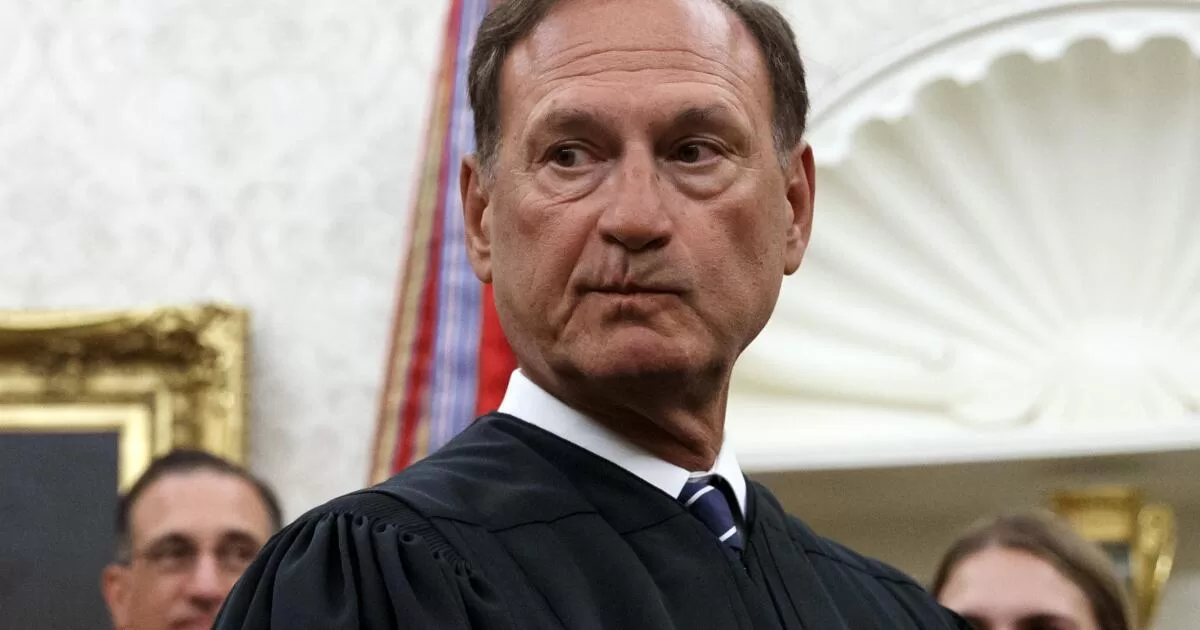When I first read about the upside-down American flag that flew at the Virginia home of Supreme Court Justice Samuel A. Alito Jr. in early 2021, I thought, “Boy, that’s dumb.”
When I later read about the “Appeal to Heaven” pine tree flag that flew at Alito’s beach home in New Jersey, I thought, “Wow, how many election denier flags is too many for a Supreme Court justice to own and display?”
Shouldn’t the answer be obvious?
A Supreme Court justice should never behave in a manner that can be interpreted as politically partisan. Alito has claimed that the upside-down flag, a distress signal adopted by those denying Donald Trump’s 2020 election loss, was raised by his wife during a political dispute with neighbors. Tawdry as that sounds, it doesn’t matter. It‘s his house, too.
“A Supreme Court justice appears to have embraced election denialism,” Alicia Bannon of New York University’s Brennan Center for Justice told Reuters. “That’s a five-alarm fire.”
A sitting federal judge even weighed in: “Flying those flags was tantamount to sticking a ‘Stop the steal’ bumper sticker on your car,” Massachusetts-based senior U.S. District Judge Michael Ponsor wrote in a New York Times essay chastising Alito. “You just don’t do it.”
You just don’t do it.
The U.S. Supreme Court didn’t even have an official code of ethics until late last year, unlike the rest of the federal judiciary. Imagine: lifetime tenure and no codified ethics rules.
The idea that justices can be expected to monitor themselves for conflicts of interest and ethical lapses is absurd. No one can fairly judge themselves.
And now all the court has is a toothless set of guidelines with no enforcement mechanism.
For those whose reflexive what-aboutism kicks in whenever MAGA world comes under fire, it’s important to acknowledge that it was also wrong for Justice Ruth Bader Ginsburg to criticize then-presidential candidate Trump in 2016.
“I can’t imagine what this place would be — I can’t imagine what the country would be — with Donald Trump as our president,” RBG told the New York Times during an interview in her chambers four months before the election. “For the country, it could be four years. For the court, it could be — I don’t even want to contemplate that.”
(And it was improper for Justice Sonia Sotomayor to routinely ask her staff to prod libraries, universities and schools to buy her books ahead of speaking engagements. She also should have recused herself from a case involving her publisher. )
But when Ginsburg publicly let loose on Trump, hardly anyone thought the reality show billionaire was going to beat Hillary Clinton. Even Trump didn’t think he would win. Still, it was an inappropriate, incautious statement from a Supreme Court justice who should have known better.
And, days later, she confessed as much: “On reflection, my recent remarks in response to press inquiries were ill-advised, and I regret making them,” she said in a written statement released by the court. “Judges should avoid commenting on a candidate for public office. In the future I will be more circumspect.”
Ginsburg’s self-flagellation was not good enough for the Wall Street Journal’s conservative editorial board, which demanded that she resign or at the very least recuse herself from cases involving the presidential race and related matters. (She did not.)
But the Journal has made no such demand of Alito. Instead, right-wing media are awash with pieces about how the “left” is smearing the poor man.
This is the same defense trotted out by supporters of Justice Clarence Thomas, whose wealthy patrons have lavished him and his wife, Ginni, with a bonanza of hundreds of thousands of dollars in trips, private school tuition for a relative, an expensive RV and who knows what other blandishments. The Journal called ProPublica’s bombshell investigation of Thomas a “phony ethics assault.”
Unlike Ginsburg, Alito has not apologized for flying the flags nor, come to think of it, for failing to disclose that he accepted a 2008 trip to a luxury fishing lodge in Alaska from Republican donors, one of whom had an interest in cases before the court.
Instead, like his much-criticized colleague Thomas, he has responded with petulance.
Senate Judiciary Committee Chair Richard Durbin of Illinois and member Sheldon Whitehouse of Rhode Island last week asked Chief Justice John G. Roberts Jr. to direct Alito to recuse himself from any cases related to the 2020 presidential election and the Jan. 6, 2021, attack on the Capitol, which of course include the question of whether former President Trump has immunity from prosecution.
“The Court’s Code of Conduct has failed to redress or prevent any of these ethics violations, largely because it contains no enforcement mechanism,” they wrote.
Last year, the committee advanced a bill, the Supreme Court Ethics, Recusal and Transparency Act, that has yet to be taken up by the whole Senate and may never come to a vote given that body’s antiquated rules. The bill would require the justices to adopt a strict code of ethics and create a process for investigating and addressing alleged violations.
The court, whose credibility is near an all-time low, should have taken this step without prodding.
I had a good chuckle when I read in the Journal that “the people undermining confidence in the Supreme Court are those acting as if Justice Alito is sending secret signals from the flagpole at his beach house.”
You’ve got to be kidding, guys. There’s nothing secret about it.
